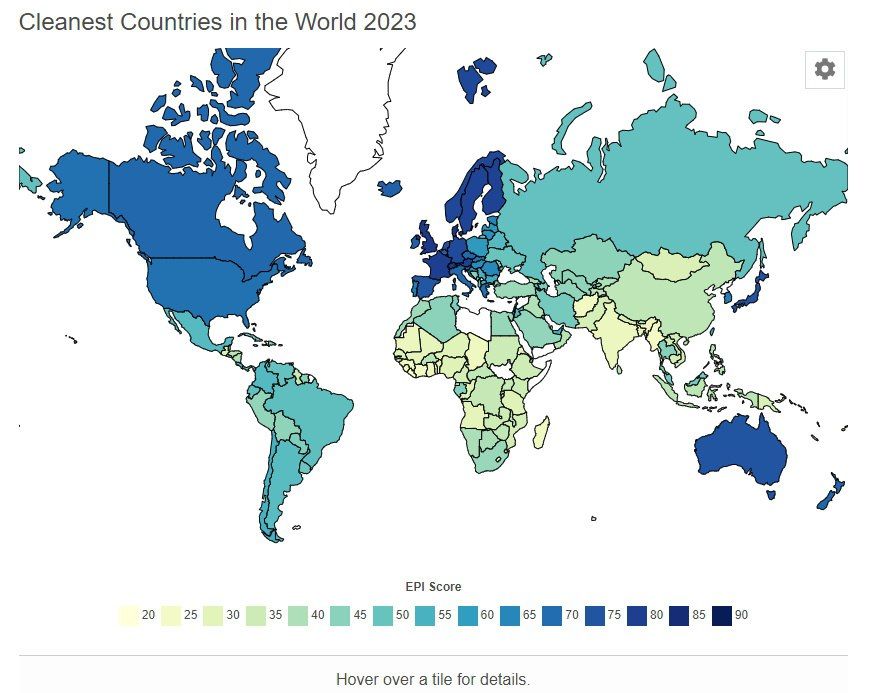The Cleanest Countries in the World in 2023 Revealed
The ranking of the cleanest countries in 2023 shows that preserving the environment is becoming increasingly relevant and important on a global scale. The development of environmental technologies and the implementation of environmental measures are becoming an integral part of the development strategy of many countries.
How was the ranking compiled?
The study, conducted by researchers from Yale University and Columbia University in collaboration with the World Economic Forum, attempts to assess the level of environmental cleanliness and the state of ecology in 180 countries around the world. To achieve this, 32 indicators covering 11 categories related to ecosystem viability and environmental conditions were measured.

The compilers of the ranking took into account various factors that are key in determining the cleanliness and environmental sustainability of countries. One of the main criteria is ecosystem viability, which includes the preservation of biodiversity, ecosystem restoration, protection of natural resources, and the use of sustainable agricultural practices.
Another important criterion is the state of the environment, which is evaluated based on various indicators, including air quality, water pollution, soil pollution levels, greenhouse gas emissions, and the efficiency of natural resource utilization.
TOP 10 most environmentally friendly countries in 2023
| Rank | Country |
|---|---|
| 1 | Denmark |
| 2 | Luxembourg |
| 3 | Switzerland |
| 4 | United Kingdom |
| 5 | France |
| 6 | Austria |
| 7 | Finland |
| 8 | Sweden |
| 9 | Norway |
| 10 | Germany |
As a result of the research, a ranking of the “Cleanest Countries in 2023” was compiled. Denmark, Luxembourg, Switzerland, the United Kingdom, France, Austria, Finland, Sweden, Norway, and Germany made it to the top ten. All of these countries are known for their high level of economic development and rank among the wealthiest countries in the world.
Denmark secured the first place in the ranking of the cleanest countries in the world. This country is renowned for its advanced environmental technologies and strict standards. It actively invests in renewable energy, utilizing wind farms and solar panels. Additionally, Denmark actively reduces harmful emissions and improves air quality. It is no wonder that it has taken the leading position in the ranking.
Luxembourg is in second place. This small country is known for its efforts in nature conservation and ecology. Luxembourg takes measures to protect biodiversity, increase forested areas, and preserve water resources. Moreover, actions are taken to reduce the use of plastic, and environmentally friendly transportation options are promoted.
Switzerland claimed the third position. The country is famous for its landscapes and clean air. It actively develops environmentally friendly tourism and invests in the preservation of natural habitats. Switzerland also effectively manages waste and efficiently recycles it.
Clearly, all of these countries possess a high level of awareness and understanding of the importance of environmental issues. They strive for sustainable development, nature preservation, and reducing negative impact on the environment. Thanks to these efforts, they have achieved such high rankings in the list of the cleanest countries in the world.
One of the reasons for such a high level of environmental consciousness in these countries is the population’s high level of awareness of environmental issues. The citizens of these countries actively realize the importance of ecological balance and strive to preserve the cleanliness of the environment. They aim to use renewable energy sources, implement technologies that do not pollute the environment, and create infrastructure for separate waste collection and disposal.
By compiling the ranking of the cleanest countries in 2023, researchers from Yale University and Columbia University have demonstrated that environmental issues are a significant aspect for many nations. These data can serve as a basis for developing measures to improve the environmental situation in other countries and encourage the implementation of environmentally friendly technologies and practices.













